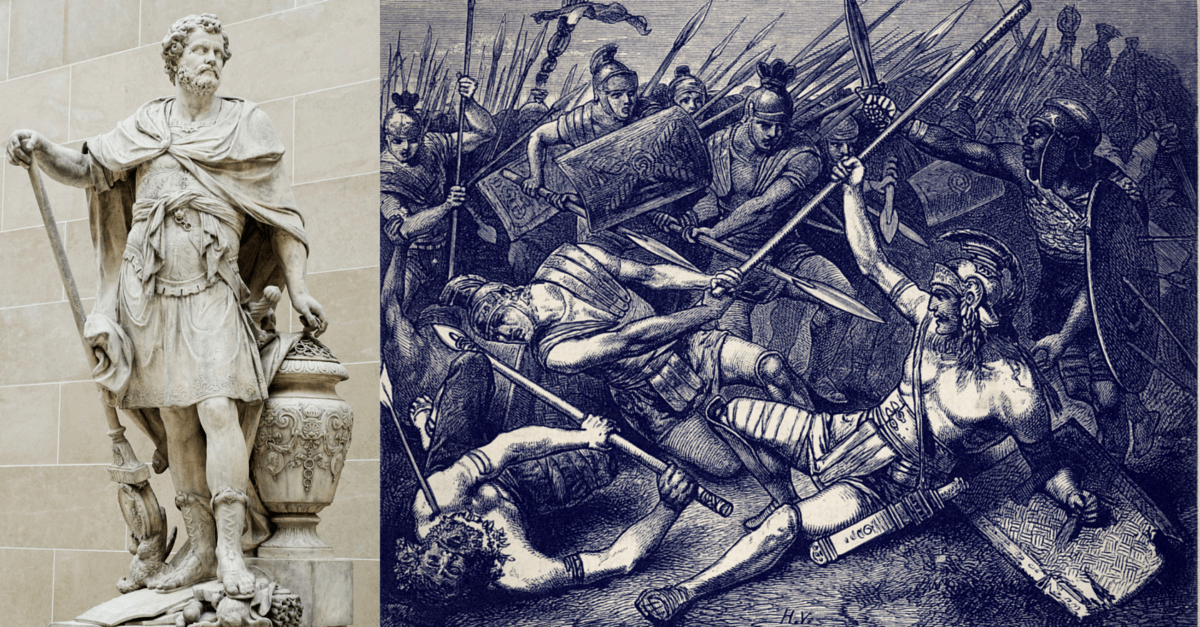Throughout the history of Rome, from the Kingdom of the 700’s BCE to the fall of the Empire in 476, there have been individuals who inspired fierce hate and loathing from the Roman people. Some of these men and women inflicted terrible losses through multiple battles, others simply embarrassed the Romans, or were so anti-Roman that they were despised almost for existing. This list is roughly chronological and hardly complete, expect part two in the future.
Brennus
Brennus is an interesting figure in the history of Rome, as he can be argued to have helped Rome as much as he hurt her. In the 4th century BCE, Brennus and his group of Gauls were rampaging south through Italy. We aren’t exactly sure why, they may have just been plundering, or perhaps they were mercenaries on their way to serve in the Greek-occupied area of Southern Italy.
The Gauls were attacking the Italian city of Clusium when Roman ambassadors appeared to negotiate peace. All negotiations fell apart when the supposedly neutral Roman ambassadors fought against the Gauls in a skirmish near the town, prompting an all-out Gallic march against the woefully unprepared Romans.
The battle of Allia near Rome was an easy victory for Brennus, and he was able to waltz into Rome and capture everything but the Capitoline Hill. Here the Romans held out for some time, especially with the aid of their holy geese, and eventually Brennus offered peace in exchange for a huge sum of gold. As the Romans were weighing the gold, they complained to Brennus that his men were altering the weights to get more gold.
In response, Brennus threw his sword on the scales, demanding its weight in additional gold and said to the Romans “Vae Victis” or “woe to the conquered.” Few other phrases were so grating to Roman ears, then and for centuries after.
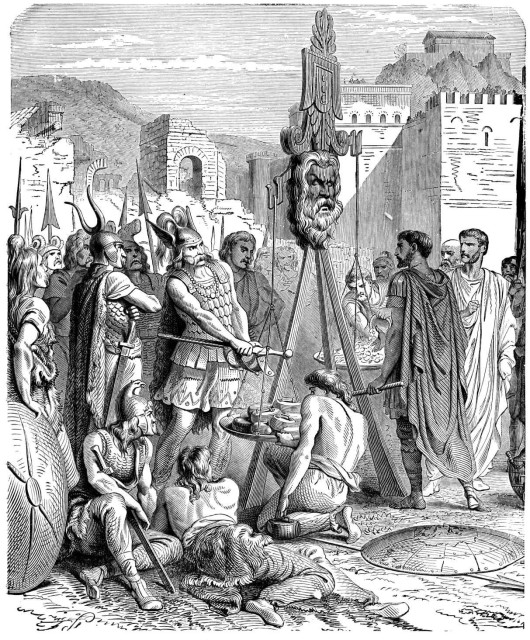
This utterly embarrassing episode possibly ended with the Romans tracking down Brennus and regaining their gold after destroying his army, but more than anything it instilled into the Romans the desire never to be the conquered again. The hatred of the Gauls also stems from this episode, explaining the great expansions into Gaul in later years.
Hannibal
This is a no-brainer. Everyone knows how Hannibal crossed the Alps with his terrifying elephants and won a string of supremely impressive victories. Well, the Romans understandably hated this man for doing so, and for much more.
Yes, Hannibal had inflicted horrible losses, but the way he did it was infuriating. The first big battle at the Trebia was won by irritating and taunting the Roman commander Sempronius into attacking at dawn across an icy river in freezing rain. The next battle at Trasimene saw Hannibal launch an ambush with his entire army, slamming into the unprepared marching column of Flaminius, killing him and most of his men.
The Romans thought they had him at Cannae; they had an army twice the size of Hannibal’s, they anchored their flanks with a river and had the battle in the open to prevent Hannibal’s tricks and traps. Yet, Hannibal used this overconfidence to inflict one of the worst defeats the Romans would ever endure.
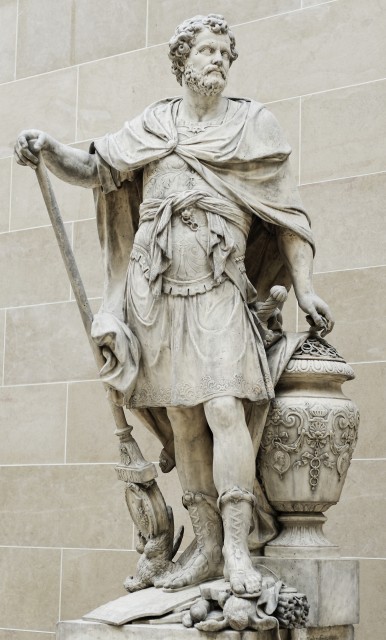
The defeat at Cannae forced the Romans into a defensive battle for Italy, a move that the aggressive Romans hated almost as much as losing the actual battles. The long grinding war fueled the hate and fear, and eventually Hannibal became a boogeyman type figure, with parents telling their kids “you better behave or Hannibal will get you.” The Romans feared Hannibal potentially marching on Rome at any moment.
Though Hannibal was finally brought back to Africa and defeated by Scipio Africanus, he was still relentlessly pursued by the Romans. Assassins likely pursued him and ambassadors called for foreign kings to hand him over.
Spartacus
Spartacus shares one significant similarity with the great Hannibal. They both had an annoyingly long string of successes right in the heart of Italy. Hannibal’s invoked more utter fear, whereas Spartacus’ revolt was initially seen as a very ill-timed annoyance.
When Spartacus, the Thracian slave fighting out of Capua, revolted, he quickly gathered many thousands of fellow gladiators, slaves and many who just wanted an opportunity to fight for a better life. The Romans had legions at either end of their empire, quelling a rebellion in Spain and dealing with the crafty Mithridates in a third tough war in modern Turkey.
The rebellion was seen as a matter for local enforcement anyway, so it was not odd to have a local militia sent to take care of things. The hatred for Spartacus quickly grew when he destroyed this force and holed up on Mount Vesuvius. A larger Roman force was sent to starve the rebels out, blocking the paths down from the mountain.
The Romans were again embarrassed when Spartacus organized a cliff descent around to the Roman rear where their carelessly unfortified camp was invaded and almost all of the Romans were killed.
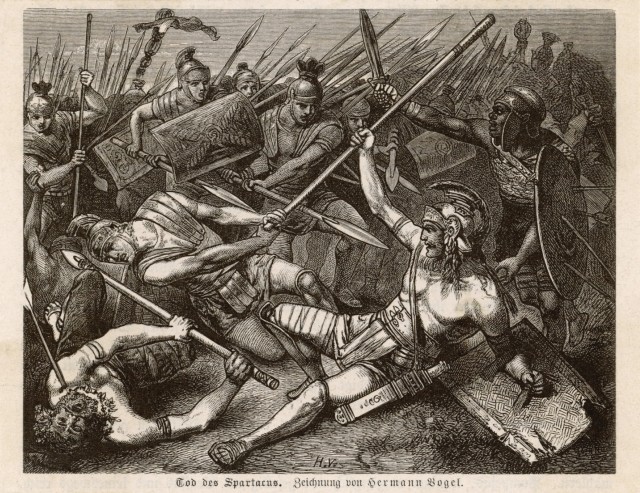
The Romans had strings of success and failures from then onward as they were grudgingly forced to throw more men and funds at the problem. Eventually the richest man in Rome, Crassus organized a massive, trained army and forced Spartacus back to the toe of Italy where the rebels frantically tried to arrange passage to Sicily. In the last great battle, Spartacus was lost in the fighting as the rebels were slain or captured to be crucified along the Appian Way as a strong message to future slaves.
The humiliating defeats combined with the lack of entertainment and other slave-based amenities that had been taken for granted greatly frustrated the Romans. They had reached an era of easy living, only for one man’s rabble rousing to mess it all up.
Cleopatra
This list takes a sharp turn with Cleopatra, a very divisive figure of the ancient world. You might wonder why she was so hated, as Caesar and Mark Antony clearly didn’t hate her, but the Roman people were whipped into a fierce loathing of Cleopatra as a lead up to the last war of the Roman Republic.
Cleopatra was quite the romancer. At 21, she immediately seduced the 52-year-old Caesar during their first meeting. She and Caesar had a son named Caesarion, who she constantly promoted to hold power in Egypt and Rome, to the ire of the Roman elite, especially considering that Caesar was married to a good Roman woman. Cleopatra’s devious charm further got under the skin of most Romans when she snatched up Mark Antony after Caesar’s assassination.
Antony had a lot of business that took him through Alexandria, and the charm of Cleopatra grew to the point where Antony made the city his permanent home. He also had children with Cleopatra. During this period, Cleopatra underwent investigation for giving funds to the Pompeian faction, and she also had her sister, Arsinoe, assassinated for siding with her brother Ptolemy during the sibling’s struggle for power.
This assassination was abhorred by the Romans because it was carried out on the very steps of the temple where Arsinoe sought sanctuary, a gross sacrilege. Still further Cleopatra was seen to have corrupted the once proudly Roman Mark Antony into becoming a loyal “Egyptian,” though this outrage was stoked by Octavian during the struggle for power and attempt to gain just cause for war.
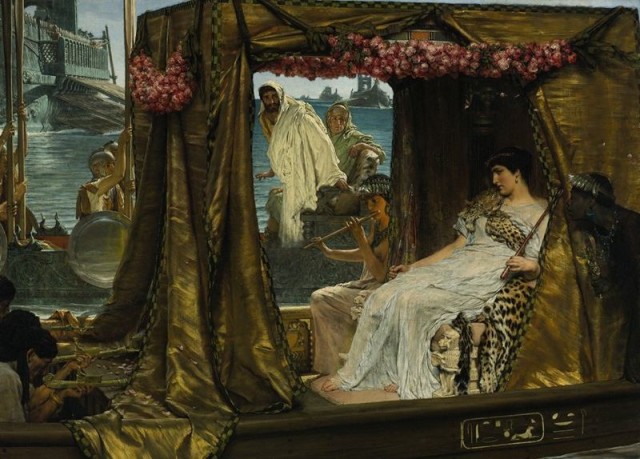
This theme culminated with Antony’s Donations of Alexandria, which was an act by Antony and Cleopatra that gave vast Roman lands and titles to Cleopatra and her sons, especially Caesarion. The lands covered everything from the Crimean Peninsula to the southern edge of Egypt.
This was an act of total disrespect for Roman power and showed that Antony might desire his own empire to rival Rome. To cap it all, the pair were dressed as a combination of Roman and Egyptian gods during their announcement of the donations to the people.
The hatred for Cleopatra differs greatly from the others on this list as she was often hated because of gossip. Even so, tales of Cleopatra’s sweet entrancing words spread through the streets of Rome. The “abduction” and conversion of one of the most beloved Romans of the time really made it easy for the Romans to go to war against her and Antony, as it was being seen less like a civil war and more of a war against Egyptian influence, at least by the general populace.
By William McLaughlin for War History Online
